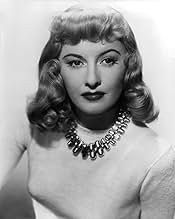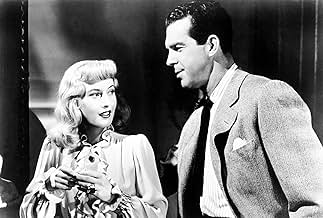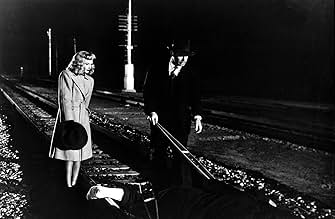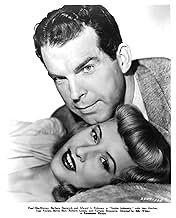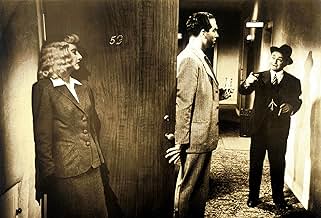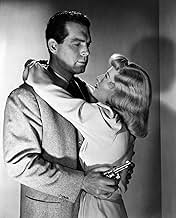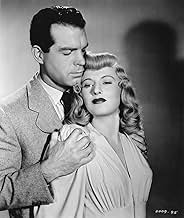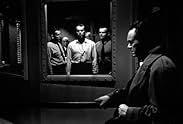Un rappresentante delle assicurazioni si lascia convincere da una casalinga seduttrice in un piano di omicidio che suscita il sospetto di un investigatore assicurativo.Un rappresentante delle assicurazioni si lascia convincere da una casalinga seduttrice in un piano di omicidio che suscita il sospetto di un investigatore assicurativo.Un rappresentante delle assicurazioni si lascia convincere da una casalinga seduttrice in un piano di omicidio che suscita il sospetto di un investigatore assicurativo.
- Regia
- Sceneggiatura
- Star
- Candidato a 7 Oscar
- 5 vittorie e 9 candidature totali
Lev Abramov
- Stage Hand
- (non citato nei titoli originali)
James Adamson
- Pullman Porter
- (non citato nei titoli originali)
John Berry
- Bit Part
- (non citato nei titoli originali)
Raymond Chandler
- Man Reading Magazine Outside Keyes' Office
- (non citato nei titoli originali)
Edmund Cobb
- Train Conductor
- (non citato nei titoli originali)
Kernan Cripps
- Conductor
- (non citato nei titoli originali)
Betty Farrington
- Nettie - Dietrichsons' Maid
- (non citato nei titoli originali)
Bess Flowers
- Norton's Secretary
- (non citato nei titoli originali)
Riepilogo
Reviewers say 'Double Indemnity' is acclaimed for Billy Wilder's direction, standout performances by Fred MacMurray, Barbara Stanwyck, and Edward G. Robinson, and its pioneering film noir style. The intricate plot, dark themes, and exploration of human nature are often lauded. Voice-over narration, sharp dialogue, and unique cinematography heighten its suspense. Despite minor pacing issues and plot inconsistencies, its impact on the noir genre and cinema is significant. The lead characters' chemistry and moral complexities are noted for enhancing dramatic tension.
Recensioni in evidenza
"I liked the way that anklet bit into her leg. I wanted to see her again, up close, without that silly staircase between us."--Walter Neff, after meeting Phyllis Dietrichson This is Fred MacMurray like you've never seen him before. He's edgy and sharp, and amoral, although he hides it well from his boss. Barbara Stanwyck's astounding performance set the standard for bad girls in Film Noir for years to come. I love this film because it is a perfect example of how the censorship of the time made it so that filmmakers had to get the sexiness across in a subtle way. This movie is undeniably sexy, and there's not a single 'love scene' in it!
This is one of the best films of all time, not necessarily because of its story but because of the acting, direction, cinematography, lighting, and just the way that the story itself was told. At the time the film was released, the idea of revealing who the killer was in the opening scene was virtually unheard of, but it ended up being very effective because it allowed the audience to concentrate more on other elements of the film, which was the goal of Billy Wilder, the director. Instead of trying to figure out who the perpetrator was, there is more emphasis on how the crime was pulled off, what mistakes were made during the murder, who betrayed who, how close Barton Keyes (the insurance investigator) was getting to solving the case, and, probably most importantly, what kind of person Walter Neff is and whether or not sympathy should be felt toward him.
Barbara Stanwyck, in one of the most remembered performances of her extensive career, represents (with nearly flawless ease) the cold and ruthless manipulator who has no difficulty in ruining other people's lives in various ways (including death, if necessary) in order to get what she wants. Known in the film community as the `femme fatale,' this is someone who uses her sexual prowess, seductiveness, and emotional detachment to drag an unsuspecting person (generally an interested man) into a scheme from which she is expected to benefit heavily and he is most likely headed for destruction. In these types of films, the man often either finds his life in ruins or ends up dead, as is often (but not always) also the case with the fate of the femme fatale.
Barbara Stanwyck (as Phyllis Dietrichson, the murderous femme fatale in Double Indemnity) and Fred MacMurray (as Walter Neff, her victim'), have amazing chemistry on screen. Their attraction is incredibly well portrayed, and the development of their relationship with each other is so convincing that what happens between them almost seems normal. Besides that, their mutually calculated interaction, although it seems at first like it has been rehearsed endlessly and ultimately brought unconvincingly to the screen, is exactly as it was meant to be, because it represents each character's intentions, even very subtly foreshadowing their future betrayals against each other. Phyllis has gone through every word she ever says to Walter in her head. She has practiced what she wants to say when she brings up the idea of life insurance to Walter in the beginning and she knows what she wants to say whenever they interact with each other because she has been planning for quite some time the prospect of murdering her husband in order to collect his fortune. Walter, conversely, methodically makes amorous advances as though this is something that he does regularly, and then ultimately he also plans out his conversations with Phyllis because he begins to suspect her and is sure to tell her only what he wants her to hear. This seemingly stiff dialogue brilliantly represents Phyllis and Walter's precise (and sinister) intentions, and it's quick pace creates a feeling of urgency and restlessness.
Probably the most fascinating and entertaining actor in the film, Edward G. Robinson, plays Barton Keyes, Walter's friend and employer at the insurance company where he works. Keyes is a very suspicious man who closely investigates the insurance claims which come into the company, having a striking history of accurately isolating fraudulent claims and throwing them out. His handling of Phyllis's (and Walter's, technically) claim and the way that he gets closer and closer to the truth create a great atmosphere of tension and drama.
Double Indemnity is nearly flawless. From the shocking and unexpected beginning to the already known but still surprising end, the audience is held rapt by the excellent performances, the brilliant and imaginative direction, and the flawlessly created atmosphere. This is excellent, excellent filmmaking, and is a classic film that should not be missed.
Barbara Stanwyck, in one of the most remembered performances of her extensive career, represents (with nearly flawless ease) the cold and ruthless manipulator who has no difficulty in ruining other people's lives in various ways (including death, if necessary) in order to get what she wants. Known in the film community as the `femme fatale,' this is someone who uses her sexual prowess, seductiveness, and emotional detachment to drag an unsuspecting person (generally an interested man) into a scheme from which she is expected to benefit heavily and he is most likely headed for destruction. In these types of films, the man often either finds his life in ruins or ends up dead, as is often (but not always) also the case with the fate of the femme fatale.
Barbara Stanwyck (as Phyllis Dietrichson, the murderous femme fatale in Double Indemnity) and Fred MacMurray (as Walter Neff, her victim'), have amazing chemistry on screen. Their attraction is incredibly well portrayed, and the development of their relationship with each other is so convincing that what happens between them almost seems normal. Besides that, their mutually calculated interaction, although it seems at first like it has been rehearsed endlessly and ultimately brought unconvincingly to the screen, is exactly as it was meant to be, because it represents each character's intentions, even very subtly foreshadowing their future betrayals against each other. Phyllis has gone through every word she ever says to Walter in her head. She has practiced what she wants to say when she brings up the idea of life insurance to Walter in the beginning and she knows what she wants to say whenever they interact with each other because she has been planning for quite some time the prospect of murdering her husband in order to collect his fortune. Walter, conversely, methodically makes amorous advances as though this is something that he does regularly, and then ultimately he also plans out his conversations with Phyllis because he begins to suspect her and is sure to tell her only what he wants her to hear. This seemingly stiff dialogue brilliantly represents Phyllis and Walter's precise (and sinister) intentions, and it's quick pace creates a feeling of urgency and restlessness.
Probably the most fascinating and entertaining actor in the film, Edward G. Robinson, plays Barton Keyes, Walter's friend and employer at the insurance company where he works. Keyes is a very suspicious man who closely investigates the insurance claims which come into the company, having a striking history of accurately isolating fraudulent claims and throwing them out. His handling of Phyllis's (and Walter's, technically) claim and the way that he gets closer and closer to the truth create a great atmosphere of tension and drama.
Double Indemnity is nearly flawless. From the shocking and unexpected beginning to the already known but still surprising end, the audience is held rapt by the excellent performances, the brilliant and imaginative direction, and the flawlessly created atmosphere. This is excellent, excellent filmmaking, and is a classic film that should not be missed.
Author James M. Cain virtually created a new genre with his extra-tough, sin-blackened, and sex-drenched novels--and they were so successful with the public that not even 1940s Hollywood could resist. The result was three of the most famous films of that decade: MILDRED PIERCE, THE POSTMAN ALWAYS RINGS TWICE, and DOUBLE INDEMNITY. Although POSTMAN is probably the better film, INDEMNITY is the most famous--possibly due to the story's truly psychotic edge, which is given full life by Barbara Stanwyck in one of her most celebrated performances.
Like POSTMAN, INDEMNITY offers the story of a married woman who plots with her lover to murder her husband. Given MacMurray's typically "good guy" image, I didn't expect to believe him in the role of Walter Neff in the role of skirt-hungry Walter Neff--but MacMurray's performance is exceptionally good here, and all the more effective because it so completely unexpected. But while MacMurray has most of the screen time, it is really Stanwyck and Edward G. Robinson who dominate the film. Stanwyck is truly memorable here, and gives us a woman who seems at once sexed-up and completely frigid, at once completely natural and absolutely artificial. It is a remarkable and often disturbing effect. Robinson, who endured decades of type-casting, is equally good as the blustery, slightly comic, and absolutely honest insurance man whose job it is to ferret out suspicious claims; it is largely due to his performance, which gives the film a moral center, that we are able to buy into the otherwise off-beat performances that drive the action.
This was one of director Billy Wilder's first major hits, and he deserves considerable credit for making the weird elements of the story work as a whole, keeping the film smartly paced, and heaping it up with atmosphere. So influential that its impact would be difficult to over-estimate, DOUBLE INDEMNITY is a touchstone for the entire film noir genre. Recommended.
Gary F. Taylor, aka GFT, Amazon Reviewer
Like POSTMAN, INDEMNITY offers the story of a married woman who plots with her lover to murder her husband. Given MacMurray's typically "good guy" image, I didn't expect to believe him in the role of Walter Neff in the role of skirt-hungry Walter Neff--but MacMurray's performance is exceptionally good here, and all the more effective because it so completely unexpected. But while MacMurray has most of the screen time, it is really Stanwyck and Edward G. Robinson who dominate the film. Stanwyck is truly memorable here, and gives us a woman who seems at once sexed-up and completely frigid, at once completely natural and absolutely artificial. It is a remarkable and often disturbing effect. Robinson, who endured decades of type-casting, is equally good as the blustery, slightly comic, and absolutely honest insurance man whose job it is to ferret out suspicious claims; it is largely due to his performance, which gives the film a moral center, that we are able to buy into the otherwise off-beat performances that drive the action.
This was one of director Billy Wilder's first major hits, and he deserves considerable credit for making the weird elements of the story work as a whole, keeping the film smartly paced, and heaping it up with atmosphere. So influential that its impact would be difficult to over-estimate, DOUBLE INDEMNITY is a touchstone for the entire film noir genre. Recommended.
Gary F. Taylor, aka GFT, Amazon Reviewer
Barbara Stanwyck changed the trajectory of her career with her ruthless, icy performance here. Fred MacMurray, however, would never again allow himself to duplicate anything similar to Walter Neff's troubled, doomed portrayal again on screen. Playing against their dark alliance, it is left to Edward G. Robinson to win the audience over as he struggles to shed light on the insurance fraud and murder.
This script should be studied by anyone who plans to write for TV or movies. Note the significant changes Wilder and Chandler made from James Cain's original novel - changes Cain admitted were improvements.
Especially worthy of mention is the level of artistry displayed in the final minutes when, after an hour and a half of of bitter nastiness, Wilder gives us just the smallest spoonful of sugar that wraps everything up perfectly. There's almost something criminal when evil is such a treat to watch.
Vintage Noir Film with gritty interpretation , atmospheric settings , crackling dialogue throughout and powerhouse filmmaking . This Billy Wilder's first thriller is one of the finest Noir film ever made . A scheming wife (Barbara Stanwyck) lures an insurance salesman (Fred MacMurray , though Alan Ladd, George Raft, Brian Donlevy, James Cagney, Spencer Tracy, Gregory Peck, and Fredric March were all up for the leading role) into helping murder her husband and then declare it an accident . Both of whom concoct a twisted scheme to collect the benefits of a insurance policy . As the hubby's policy contains a clause that states that if the husband's death caused by a moving train the policy pays double face value . The investigator's boss (Edward G. Robinson) , not knowing his colleague is involved in it , suspects murder and sets out to prove it .
This first-rate and entertaining American classic Noir film draws its riveting tale and power from the interaction of finely drawn roles as well as drama , emotion and moody atmosphere . This classic mystery thriller follows James M Cain's book fairly closely otherwise . Twisted film Noir about murder , troubled relationships , treason , dark secrets , including an unforgettable dialog ; being based on the James M Cain's novel , which in turn was based on the true story of Ruth Snyder, the subject of a notorious 1920s murder trial , being screen-written by the prestigious Raymond Chandler and the same Billy Wilder . However , Billy Wilder and Raymond Chandler did not get along well while writing this film's script, a process that was apparently filled with arguments . As Billy Wilder didn't really get on with the famous novelist whose constant drinking irritated the director . It packs a good realization , an original script , haunting atmosphere , intriguing events ; for that reason madness and murder prevail . Fred MacMurray is superb as insurance salesman coerced into murder plot and Barbara Stanwick as predatory and alluring Femme Fatale is magnificent . Here his colleague Edward G Robinson is extraordinary and as cool as ever ; he plays as the astute and stubborn investigator , his scenes with Fred MacMurray are awesome and at their best . But Edward G. Robinson's initial reluctance to sign on largely stemmed from the fact he wasn't keen on being demoted to third lead . Good support cast formed by notorious secondaries such as Porter Hall , Tom Powers , Jean Heather , Byron Barr and Fortunio Bonanova . And Raymond Chandler's cameo , this marks the only film appearance of screenwriter and novelist Raymond Chandler .
Exciting as well as complex film , possessing a mysterious and fascinating blend of gripping thriller , serenity , baroque suspense in which especially stands out the portentous performances , evocative cinematography in black and white by John F. Seitz and thrilling musical score by the classic Miklos Rozsa . The motion picture was stunningly directed by the great Billy Wilder , as the American Film Institute ranked this as the #29 Greatest Movie of All Time . The film was nominated for 7 Academy Awards but lost out on the night to Going my way (1944) by Leo McCarey. It got a deep inspiration for other films , it is particularly obvious for ¨Body heat¨ by Lawrence Kasdan with William Hurt , Kathleen Turner and Richard Crenna . Remade for TV in 1954 by Buzz Kulik with Frank Lovejoy , Ray Collins and Laraine Day , and 1973 TV remake of the 1940s classic by Jack Smight with Richard Crenna , Samantha Eggar , and Robert Webber .
This first-rate and entertaining American classic Noir film draws its riveting tale and power from the interaction of finely drawn roles as well as drama , emotion and moody atmosphere . This classic mystery thriller follows James M Cain's book fairly closely otherwise . Twisted film Noir about murder , troubled relationships , treason , dark secrets , including an unforgettable dialog ; being based on the James M Cain's novel , which in turn was based on the true story of Ruth Snyder, the subject of a notorious 1920s murder trial , being screen-written by the prestigious Raymond Chandler and the same Billy Wilder . However , Billy Wilder and Raymond Chandler did not get along well while writing this film's script, a process that was apparently filled with arguments . As Billy Wilder didn't really get on with the famous novelist whose constant drinking irritated the director . It packs a good realization , an original script , haunting atmosphere , intriguing events ; for that reason madness and murder prevail . Fred MacMurray is superb as insurance salesman coerced into murder plot and Barbara Stanwick as predatory and alluring Femme Fatale is magnificent . Here his colleague Edward G Robinson is extraordinary and as cool as ever ; he plays as the astute and stubborn investigator , his scenes with Fred MacMurray are awesome and at their best . But Edward G. Robinson's initial reluctance to sign on largely stemmed from the fact he wasn't keen on being demoted to third lead . Good support cast formed by notorious secondaries such as Porter Hall , Tom Powers , Jean Heather , Byron Barr and Fortunio Bonanova . And Raymond Chandler's cameo , this marks the only film appearance of screenwriter and novelist Raymond Chandler .
Exciting as well as complex film , possessing a mysterious and fascinating blend of gripping thriller , serenity , baroque suspense in which especially stands out the portentous performances , evocative cinematography in black and white by John F. Seitz and thrilling musical score by the classic Miklos Rozsa . The motion picture was stunningly directed by the great Billy Wilder , as the American Film Institute ranked this as the #29 Greatest Movie of All Time . The film was nominated for 7 Academy Awards but lost out on the night to Going my way (1944) by Leo McCarey. It got a deep inspiration for other films , it is particularly obvious for ¨Body heat¨ by Lawrence Kasdan with William Hurt , Kathleen Turner and Richard Crenna . Remade for TV in 1954 by Buzz Kulik with Frank Lovejoy , Ray Collins and Laraine Day , and 1973 TV remake of the 1940s classic by Jack Smight with Richard Crenna , Samantha Eggar , and Robert Webber .
Lo sapevi?
- QuizAuthor James M. Cain later admitted that if he had come up with some of the solutions to the plot that screenwriters Billy Wilder and Raymond Chandler did, he would have employed them in his original novel.
- BlooperWhen Walter first kisses Phyllis, a wedding ring can be seen on Walter's hand. Fred MacMurray was married, and the ring was not noticed until post-production.
- Citazioni
[last lines]
Walter Neff: Know why you couldn't figure this one, Keyes? I'll tell ya. 'Cause the guy you were looking for was too close. Right across the desk from ya.
Barton Keyes: Closer than that, Walter.
Walter Neff: I love you, too.
- Curiosità sui creditiOpening credits are shown over a silhouette of a man on crutches, walking toward the camera.
- ConnessioniEdited into Il mistero del cadavere scomparso (1982)
I più visti
Accedi per valutare e creare un elenco di titoli salvati per ottenere consigli personalizzati
Dettagli
- Data di uscita
- Paese di origine
- Sito ufficiale
- Lingua
- Celebre anche come
- Pacto de sangre
- Luoghi delle riprese
- 6301 Quebec Drive, Hollywood Hills, Los Angeles, California, Stati Uniti(Dietrichson house)
- Azienda produttrice
- Vedi altri crediti dell’azienda su IMDbPro
Botteghino
- Budget
- 927.262 USD (previsto)
- Lordo in tutto il mondo
- 21.026 USD
- Tempo di esecuzione1 ora 47 minuti
- Colore
- Proporzioni
- 1.33 : 1
Contribuisci a questa pagina
Suggerisci una modifica o aggiungi i contenuti mancanti

Divario superiore
What is the streaming release date of La fiamma del peccato (1944) in Australia?
Rispondi


